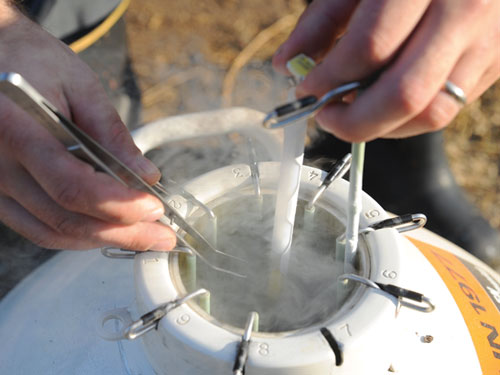Estrous synchronization (ES) aids the breeding process in two key ways.
“ES reduces and sometimes eliminates the labor of detecting estrus and allows the producer to schedule breeding,” Carroll County, Ark., University of Arkansas Extension Agent Olivia Curry said.
If the majority of a herd can be induced to exhibit estrus at about the same time, the producer can arrange for a few days of intensive insemination, Curry said.
Although the total amount of labor involved with insemination may not be reduced, it is condensed into a briefer time.
Benton County, Ark., U of A Extension Agent Johnny Gunsaulis said his opinion is that estrous synchronization is by far the best way for most beef producers to implement an AI program.
ES used with AI have huge benefits on time requirements.
“To me, it’s just worth the time savings to do the timed AI,” Gunsaulis said.
The cattle go through the chute three times and they’re bred.
“(ES) can help create a more uniform calf crop, enabling more cows to be Artificially Inseminated to a genetically superior bull and reduce the length of the breeding season.”
However, with this method is not as effective.
There is only a 50 to 60 percent change of the cow of heifer to be bred, but the benefit is that they’re all bred at the same time.
The other argument is that there is a higher percent bred watching heats and individual AI.
Over a three-week period, even if they caught 80 percent of their cattle in heat, that is a high percentage.
Then if the AI technician is 75 percent successful on settling one time breeds, it can be considered a successful breeding cycle.
That means that 80 percent of them identified in heat X 75 percent success rate = 60 percent of those animals bred over a period of 21 days (at best, probably more like 50 percent).
So, basically producers trade the extra expense of the timed AI protocol for a savings in labor over a three-week period.
“Of course it’s up to each farm what works for them though,” Gunsaulis said.
ES and AI come with a cost like most management practices do.
AI might be economically beneficial to one producer and not to another.
“If you have a large herd it may be cheaper for the producer to just maintain a bull especially if you aren’t targeting niche markets that require superior genetics,” Curry said.”






